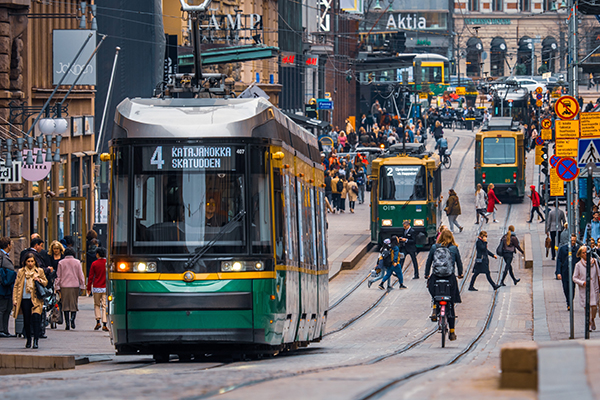Mobility in the time of COVID-19
April 27, 2020
Share

For many of us, the COVID-19 pandemic has led to drastic changes in how we move about in our daily lives. Adhering to social distancing rules, millions of people are now working and socializing from home — only venturing out for essential trips. This shift marks a stark contrast to a mere few months ago when many were able to freely move about, not only of necessity but for desire and fun.
Queen’s researcher Jennifer Ruth Hosek (Language, Literatures and Cultures; Gender Studies; Film and Media) is working on urban mobility studies and petrocultures (social and cultural study of energy sources). She has found that the COVID-19 situation is impacting how we view mobility.
“Typically, mobility expresses privilege,” says Dr. Hosek. “In these times of the virus, however, immobility expresses privilege, with self-isolation understood to demonstrate exemplary citizenship to boot. This is clear a reversal of the mobility paradigm.”
A complicating factor is the harsh reality that much of humanity cannot participate in such immobility. This includes medical personnel, such as doctors, nurses and other frontline hospital workers needed to attend to the sick and to monitor and test populations. They are hailed around the world for their heroism during this crisis. This recognition also extends to other professionals such firefighters and police who are working to keep our communities safe and protected.
According to Hosek, the definition of “frontline” is finally starting to broaden. It is extending to service workers such as warehouse laborers, paid drivers, and grocery store employees who may not have the choice to stay home. Their mobility ensures essential services like garbage pickup and much less essential services like home delivery of consumer goods. These workers are seldom mobile based upon particular expertise, but because they need employment, whether or not they may be more vulnerable to illness.
“Once those of us who have the privilege to be able to stay at home acknowledge this latter group as frontline, our immobility becomes less noble,” says Hosek. “In today's world in which so many of us are choosing immobility, there are millions of others for whom both immobility and mobility present impossible options and even deadly peril.”
However, in virus times, even the privileged feel the detriments of immobility. It can spell work disruptions, meaning-of -life crises, loneliness, and boredom. Such challenges belie the idea of immobility as fundamentally privileged.
And this reality: that our current immobility is both profoundly unjust and profoundly unsatisfying, is driving us towards what needs to be done – recalibrate our mobility assets.
It may not seem immediately obvious, but Hosek points out that the long-time, hypermobility of the privileged few has promoted this hypermobile pandemic. Fuel emissions further climate change, which fosters disease spread, just to name a few issues. High speed hypermobility is untenable, while equitable distribution of mobility furthers environmental and human health.
Now, this pandemic has revealed that inequitable mobility – and its associate inequitable immobility – is unfair, unfun, and unsustainable. Hosek says it has also simultaneously shown that we must fundamentally revamp societal infrastructures. All of which points to a solution.
Working together, governments must deploy fiscal policies – such as debt buyback, quantitative easing, and job guarantees – and largescale projects – such as renewables and public transit – to resuscitate the economy while overcoming this disease and mitigating recurrences, in part through flattening the mobility differential globally.
According to Hosek, "The painful realities of the new mobile order in the time of COVID-19 demonstrate that more equitably distributed, moderate mobility is both more sustainable and more worth sustaining."